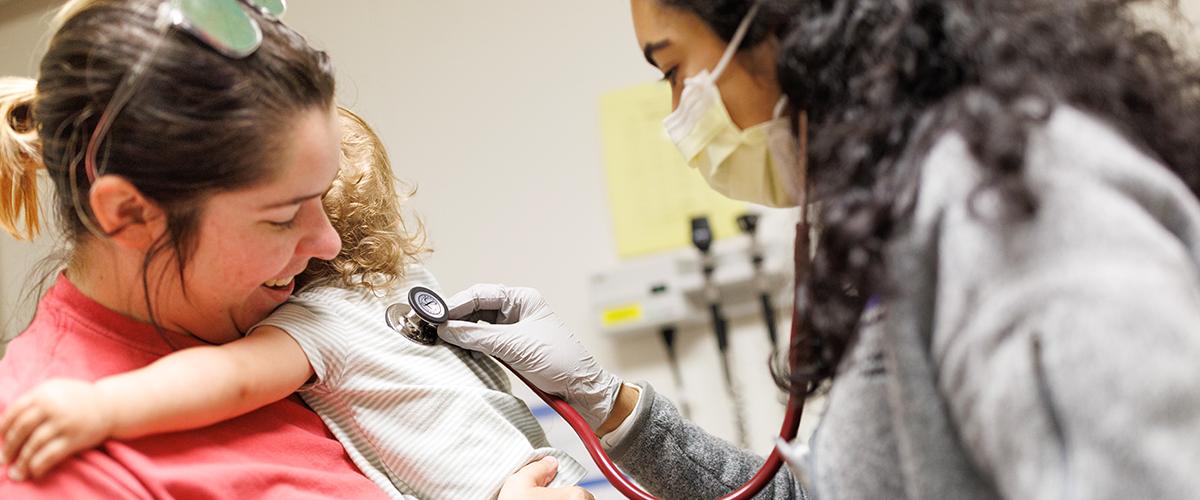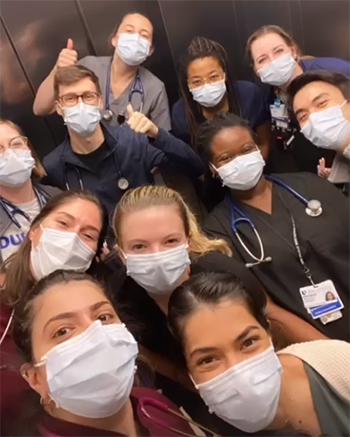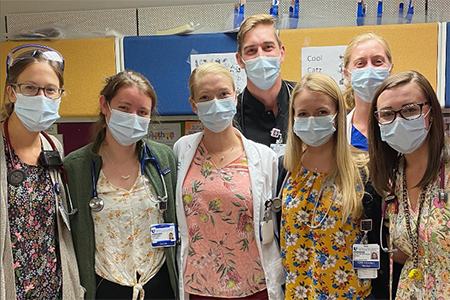
Overview
The curriculum in general pediatrics fulfills the requirements specified by the American Board of Pediatrics. For an overview of this curriculum, please see the rotation and conference descriptions below. Our goal is to provide the highest quality education in general pediatrics to allow residents to be successful leaders in all fields of pediatrics.
The Chair of the Curriculum Committee works closely with a team of Education Managers who run each rotation. These Education Managers are Duke faculty members who have been specially trained in graduate medical education. The Education Managers are supported by the Curriculum Committee in developing meaningful goals, objectives, instructional strategies, and evaluation strategies to promote resident learning. The pediatric residency curriculum is available as the Curriculum Online for Resident Education (CORE). Educational materials for every rotation are available at all times to our residents electronically and may be accessed by computer or mobile device.
Hands-On, Team-Based Training
The three-year residency curriculum is designed to develop outstanding pediatricians that are well-prepared to take their training in pediatrics in whatever direction they choose with a strong foundation in general pediatrics. During the training period, resident responsibilities are increased to develop caring, independent physicians. Residents are supervised by a faculty committed to teaching, clinical care, and research.

Each of the recognized pediatric sub-specialty services is available at Duke Children's Hospital & Health Center. The department encompasses the Divisions of Allergy and Immunology, Blood and Marrow Transplantation, Cardiology, Child Abuse and Neglect, Critical Care Medicine, Emergency Medicine, Endocrinology, Gastroenterology, Global Health, Hematology-Oncology, Hospital Medicine, Infectious Diseases Medical Genetics, Neonatology, Nephrology, Neurology, Primary Care Pediatrics, Pulmonary and Sleep Medicine, Quantitative Sciences, and Rheumatology.
The Division of Pediatric Surgery within the Department of Surgery offers a full complement of surgical faculty and services to pediatric patients. The Department of Radiology supports a dedicated Pediatric Imaging Center staffed by trained pediatric radiologists. Likewise, the Duke Emergency Department contains a separate Pediatric Emergency Center with dedicated staff.
Since Durham is fortunate to attract a wide variety of families, a goal of the training program is to prepare trainees to participate in care of children around the world. Philanthropic support from the Burroughs Wellcome Fund, Dr. John P. McGovern, and the Lenox Baker Children's Hospital Foundation, Inc. allows the program to offer experiences in select sites for trainees to explore healthcare in other countries.

Throughout their residency training, residents spend time in their Continuity Clinic during their Y blocks, where they provide primary care for patients and families. The Continuity Clinics are patterned after a group practice model and are supervised by attending physicians within Duke Children's Primary Care.
The residency curriculum is evaluated continuously by a curriculum committee composed of faculty and chief residents. Importantly, we encourage our own residents to be innovative and develop new rotations and educational opportunities, which benefits current and future trainees.
Residents provide continuous feedback through rotation evaluations, a monthly meeting with the chiefs and program leadership.
Chief Residents
The chief residents are faculty members of the Office of Pediatric Education and work closely with the program director and the Vice Chair of Pediatric Education in planning and conducting the teaching and patient care activities of the department. Additional duties include overseeing the resident staff activities and arranging resident schedules and conferences. They attend on the wards and also in the primary care continuity clinics and urgent care clinics. Importantly, they represent the resident perspective at many critical departmental and health system administrative and safety meetings.
Continuity Clinics
Continuity clinic is a cornerstone of pediatric residency training, offering residents the unique opportunity to develop lasting relationships with patients and their families. At Duke Pediatrics, each resident is assigned to either the North Durham or South Durham clinic at the start of training and remains at that site for all three years. Interns inherit a panel of patients from graduating residents, steadily adding to their panel through experiences in the full-term nursery, NICU, acute care clinic, emergency department, and inpatient wards. By graduation, many residents find it hard to say goodbye to the families they have come to know so well—and those families feel the same. Our clinics function as true primary care medical homes, supported by an exceptional multidisciplinary team that includes dedicated faculty preceptors, skilled Spanish interpreters, lactation consultants, mental health professionals, nurse clinicians, and social workers. Together, we care for the majority of Durham’s Medicaid population as well as children from surrounding counties, making our continuity clinic both a deeply rewarding and impactful part of residency.
Rotations
PL-1
PL-1 rotations include continuity clinic, full-term nursery, neonatal intensive care unit (NICU), inpatient general pediatrics at Duke as well as at a community hospital, inpatient hematology-oncology, community and advocacy rotation, acute care clinic, and subspecialty experiences. The PL-1 has primary responsibility for the care of inpatient and outpatient infants and children. PL-1s work as part of an interdisciplinary team that includes senior residents, faculty, students, and other personnel.
PL-2
The PL-2 year includes supervisory rotations on the wards, both at Duke and at a community hospital. During supervisory rotations, PL-2s oversee PL-1s and medical students. Additionally, PL-2s have rotations in adolescent medicine, behavior and development, mental and behavioral health, the emergency department, NICU, pediatric intensive care unit (PICU), and subspecialty experiences. PL-2s may rotate at Lincoln Community Health Center--a community health center dedicated to the care of a large medically underserved urban pediatric population.
PL-3
PL-3s serve as the senior supervisory resident on the general inpatient services and mental and behavior health clinic. PL-3s also have rotations in the emergency department and PICU. They will also work 1:1 with a hospitalist for 2 weeks on the inpatient complex care service. This is the year that interested residents have the opportunity to engage in global health rotations if they elect to. Finally, the program includes many individualized subspecialty rotations during the PL-3 year to add breadth and depth to each resident’s experience, while also allowing the resident to tailor his or her education to his or her personal and career goals.
Our Rotation Schedule
In July 2025, our residency program transitioned to an X+Y curriculum to allow for a more consistent and focused learning experience across inpatient and outpatient settings. “X” rotations are typically hospital-based, clinic-free blocks that allow residents to focus fully on inpatient care. “Y” rotations incorporate continuity clinic and are generally centered on outpatient electives, with minimal cross-coverage responsibilities. This structure not only supports work-life balance but also optimizes learning by allowing residents to be fully present in each clinical environment.